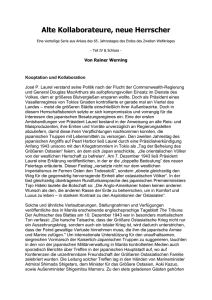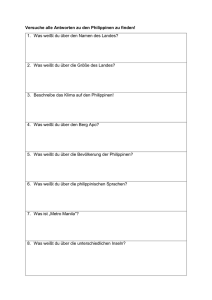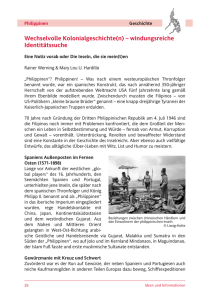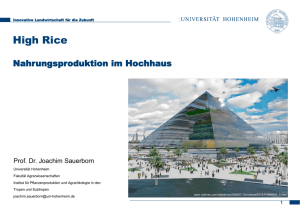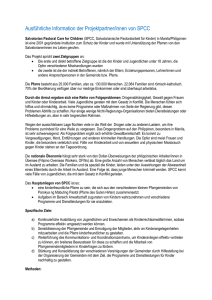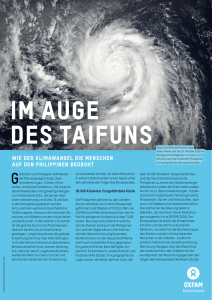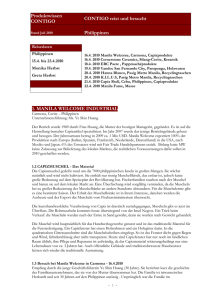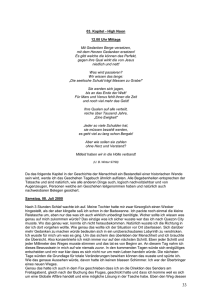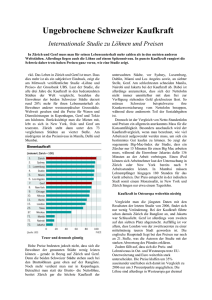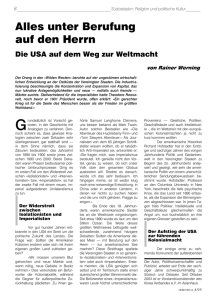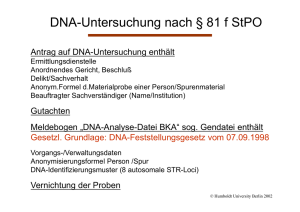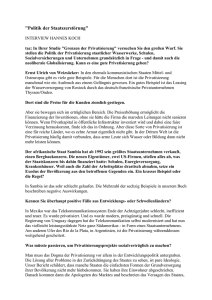The Philippine Revolution in the Proceedings of
Werbung
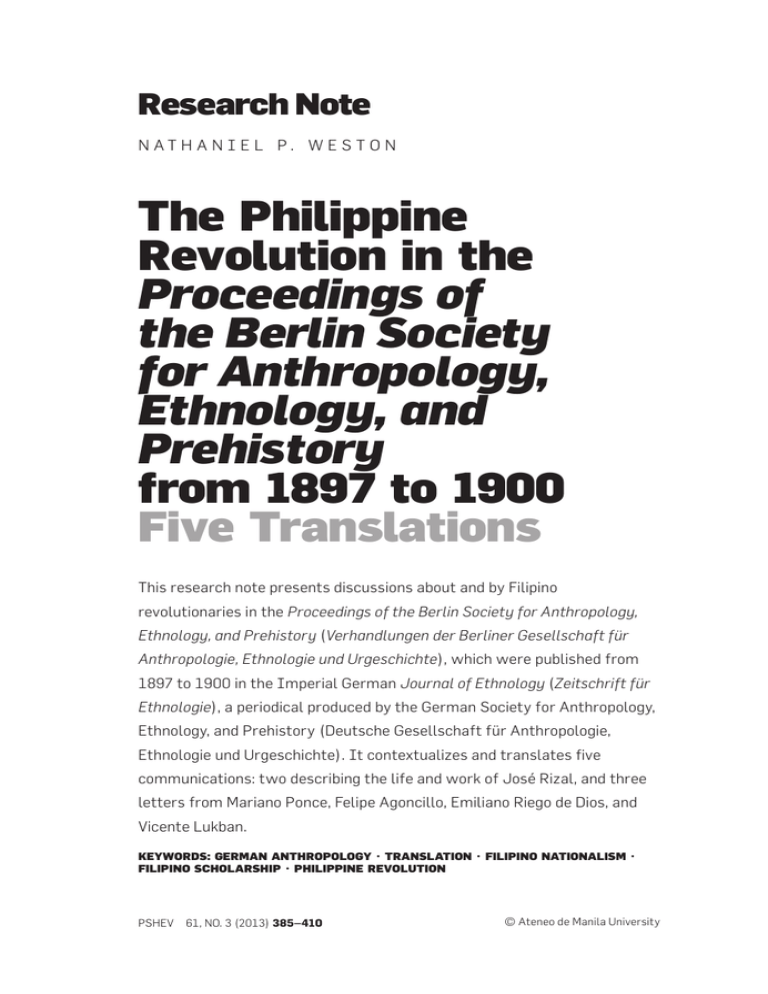
Research Note Natha n iel P . W est o n The Philippine Revolution in the Proceedings of the Berlin Society for Anthropology, Ethnology, and Prehistory from 1897 to 1900 Five Translations This research note presents discussions about and by Filipino revolutionaries in the Proceedings of the Berlin Society for Anthropology, Ethnology, and Prehistory (Verhandlungen der Berliner Gesellschaft für Anthropologie, Ethnologie und Urgeschichte), which were published from 1897 to 1900 in the Imperial German Journal of Ethnology (Zeitschrift für Ethnologie), a periodical produced by the German Society for Anthropology, Ethnology, and Prehistory (Deutsche Gesellschaft für Anthropologie, Ethnologie und Urgeschichte). It contextualizes and translates five communications: two describing the life and work of José Rizal, and three letters from Mariano Ponce, Felipe Agoncillo, Emiliano Riego de Dios, and Vicente Lukban. Keywords: German anthropology • translation • Filipino nationalism • Filipino scholarship • Philippine Revolution PSHEV 61, no. 3 (2013) 385–410 © Ateneo de Manila University T his research note contextualizes and then offers translations to English of communications about and from Filipino revolutionary leaders that appeared in the Proceedings of the Berlin Society for Anthropology, Ethnology, and Prehistory (Verhandlungen der Berliner Gesellschaft für Anthropologie, Ethnologie und Urgeschichte), published in the Journal of Ethnology (Zeitschrift für Ethnologie) (ZfE) in Imperial Germany from 1897 to 1900. The first item noted the work and execution of the medical doctor, scholar, and novelist, José Rizal (1861–1896) (Virchow 1897a, 26; Quirino 1995, 178). The second described in greater detail the Filipino’s life, labors, and the circumstances surrounding his death, in addition to including a German translation of his poem “My Final Farewell” (Mi último adiós) as well as the Spanish original (Virchow 1897b, 480–81, 575–78). Because the poem has already been translated into English (Craig 1913, 256–58), it is not included here, although an image of the title, author, translator, and opening lines of the German-language version appears below (see fig., p. 387). The next communication came in the form of a letter from Mariano Ponce (1863–1918), medical doctor and journalist, thanking Eduard Seler (1849–1922), a German scholar of Mesoamerica, for his translation of Rizal’s poem (Quirino 1995, 167; Stevenson 1976, 20). Ponce’s letter appeared in the Proceedings in both Spanish and German translation (Virchow 1898, 552–53). The final correspondence involved two letters that were sent in response to the death of Fedor Jagor (1817–1900), the German scholar best known for his comprehensive 1873 study of the Spanish colony and its peoples, Travels in the Philippines (Reisen in den Philippinen) (Jagor 1873; Grünwedel 1914). Both were addressed to Rudolf Virchow (1821–1902), the president and cofounder of the German Society for Anthropology, Ethnology, and Prehistory (Deutsche Gesellschaft für Anthropologie, Ethnologie und Urgeschichte [DGAEU]) (Ackerknecht 1953). The first letter came from Felipe Agoncillo (1859–1941), who was serving at the time as minister plenipotentiary of the first Philippine Republic (Virchow 1900a, 167–68; De Ocampo and Saulo 1977). The second letter was cowritten by Emiliano Riego de Dios (1864–1926) and Vicente Lukban (1860–1916), two military leaders in the Philippine Revolution (Virchow 1900b, 345–46; Quirino 1995, 132, 177). 386 Pshev 61, no. 3 (2013) Opening lines of Eduard Seler’s translation into German of José Rizal’s “My Final Farewell.” Source: Virchow 1897b, 577. Context A significant number of German scholars first visited the Philippines during the 1850s and published their findings in the 1860s. Jagor (1873) traveled through the Spanish colony in 1859 and 1860 (Jagor 1873, v), but was not the first to do so. Adolf Bastian (1826–1905), cofounder of the ZfE, passed through the Philippines during a trip to various Asian countries in the 1850s (Zimmerman 2001, 125; Bastian 1869, 256–99; Fabian 2000, 18). Carl Semper (1832–1893) traveled in the islands from 1858 to 1865 and served as the first General Secretary of the DGAEU (Schuberg 1895, iii–xii; Semper and Frantzius 1874). Other German scholars soon followed. Adolf Bernhard (A. B.) Meyer (1840–1911) came to the Philippines during the early 1870s (Hertel 1990–91, 118–20) and Alexander Schadenberg (1851–1896) lived, worked, and explored the Spanish colony from 1879 to 1896 (Scheerer 1923, 447–48). Finally, Wilhelm Joest (1852–1897) stopped over in the Philippines on a trip through Asia from 1879 to 1881 (Mießler 1887, 427–28; Baessler 1900, 286) and Hans Meyer (1858–1929) visited during a world tour he conducted from 1881 to 1883 (Meyer 1885, 253– 322; Sächsische Biographie 2013). Although Ferdinand Blumentritt (1853– 1913) never traveled to the Spanish colony, he nonetheless published more information about the Philippines than any other writer during the nineteenth century (Sichrovsky 1983). Virchow (1894a) did not visit the islands either, but like Blumentritt still published articles and presentations on Filipinos using materials accumulated and studies produced by others. Weston / Philippine Revolution in the Proceedings of the Berlin Society 387 Spaniards translated several of these Germans’ studies in support of Spain’s rule over and continued exploitation of the Philippines. Portions of an 1869 work by Semper were translated into Spanish in 1874 (Semper 1869, 34–64; Vidal y Soler 1874, 5–18; Semper 1874) and Jagor’s text appeared in Spanish in 1875 (Jagor 1875). Over the next decade, Spanish authors made use of the Germans’ studies in their writings about Philippine forest products, gold deposits, agriculture, geography, statistics, ethnography, coal production, zoology, and natural history (Memoria 1875; Lillo de Gracia 1877; Caicedo 1880; Cañamaque 1880; Espejo 1881; Sélys-Longchamps 1882; Moya y Jiménez 1883; Abella y Casariego 1884; Calderon y Arana 1884; Jordana y Morera 1885). Several writings by Blumentritt on the early history of colonialism in the Philippines were also translated into Spanish (Blumentritt 1882a, 1882b, 1886b). Yet, the translation of these texts also made them accessible to Filipinos literate in the language of the colonizers. Filipino nationalists employed the Germans’ studies in their writings about colonial reform and Filipino culture beginning in the early 1880s. The lawyer and political economist Gregorio Sancianco (1852–1897) was the first to integrate the translated works of Semper and Jagor into his 1881 treatise seeking colonial reform (Quirino 1995, 186; Sancianco y Goson 1881). In an 1884 speech in tribute to the Filipino artists Juan Luna and Felix Resurrección Hidalgo for winning awards at a Madrid arts exhibition, the journalist Graciano López Jaena (1856–1897) referenced Jagor’s study in support of his claim about pre-Spanish Philippine civilization (Quirino 1995, 130; López Jaena 1951, 32; Jagor 1875, 144–45, 147, 156–58, 219). The writer Pedro A. Paterno (1857–1911) also cited the work of Jagor in his 1885 novel Nínay in two passages promoting Filipino culture (Quirino 1995, 161; Paterno 1885, 42, 170; Jagor 1875, 25, 147–48). In his engagements with German scholarship, Rizal exceeded the depth reached by any Filipino yet, taking up the study of German language in 1884 and traveling to Imperial Germany two years later (Quirino 1995, 178; Rizal 1993, 193–94, 202, 209–11, 212–16, 217–20, 225–27, 228–29). Instead of merely citing the Germans’ studies of the Philippines, Rizal met several German scholars in person as he studied the history and culture of his countrymen in libraries and museums. He began a correspondence with Blumentritt in 1886 that lasted until the end of his life; he visited A. B. Meyer and toured the Royal Zoological and Anthropological-Ethnographic Museum of Dresden, where Meyer had been director since 1874. Rizal also 388 Pshev 61, no. 3 (2013) met Hans Meyer in Leipzig and received a copy of the German scholar’s study of the Igorot, a Filipino people from the northern part of the island of Luzon, and he made contact with Jagor and Virchow while attending a meeting of the Berlin Geography Society (Rizal 1992a, 1: 9, 16, 17, 39; Hertel 1990–1991, 118; Meyer 1885, 507–43). In 1887 Rizal performed a presentation in the German language on Tagalog poetry before the Berlin branch of the DGAEU. This was published in the ZfE in the same year. Rizal was a regular member of the DGAEU from 1887 to 1895 (Rizal 1887a; Virchow 1887, 12; 1888, 12; 1884,12; 1890, 12; 1891, 12; 1892, 13; 1893, 13; 1894b, 13; 1895, 13 ). Although the Germans had established themselves as the leading authorities on the Philippines, Filipinos were now beginning to join their ranks, and even displace them, as experts. Journalist Isabelo de los Reyes (1864–1938) published a collection of his writings on the ethnology, history, and customs of the Philippines in 1887 that also engaged German scholarship (Quirino 1995, 72). He dedicated the work to Blumentritt, rejected the craniological studies of Germans and others, and corrected and supplemented Hans Meyer’s vocabulary of the Tinguianes’ language (De los Reyes 1887a, 3, 9, 31; Meyer 1885, 542–43). In the same year, Paterno published a study of ancient Tagalog civilization that drew on the work of Blumentritt (Paterno 1887; Blumentritt 1886b). In 1890 Rizal issued in Paris an annotated edition of Antonio de Morga’s sixteenth-century Spanish chronicle of the Philippines for which Blumentritt composed the prologue. References to the work of De los Reyes, Blumentritt, and Jagor appeared in the text too (Rizal 1890a, vii–xxi, 10 n. 2, 27 n. 3, 280 n. 2). Paterno published a study of the Aetas also in 1890 that used evidence by Jagor, Virchow, A. B. Meyer, and Semper (Paterno 1890, 32, 189, 192, 351–57). Just as Filipinos had built upon the studies produced by German scholars, Germans likewise cited and translated the writings of Filipinos. In 1885 Blumentritt included Paterno’s Nínay in a bibliography appended to his vocabulary of Spanish words from the Philippines (Blumentritt 1885a, 53; Paterno 1885). He also drew on the work of De los Reyes and other Filipinos in articles published in the ZfE, Globus (the German illustrated geography and ethnology journal), and Das Ausland (the German geography and ethnology magazine) (Blumentritt 1885b, 1885c, 1885d, 1887). Over the following years, Blumentritt translated studies by De los Reyes in articles that appeared in Globus and the journal of the Austrian Weston / Philippine Revolution in the Proceedings of the Berlin Society 389 geography society (Blumentritt 1890; De los Reyes 1887b, 1888). Citations of De los Reyes’s works translated into German and in the original Spanish appeared in a photographic album of Filipinos edited by A. B. Meyer and Schadenberg and the DGAEU’s other journal, the Archive for Anthropology (Archiv für Anthropologie), listed several works by Filipinos in its Directories of Anthropological Literature for the Philippines in both 1891 and 1892 (Meyer and Schadenberg 1891; Lindenschmit and Ranke 1891, 56; 1891– 1892, 79). The relationship between German scholars and Filipino nationalists also surfaced on the pages of the periodical La Solidaridad founded in 1889 and published in Spain. Blumentritt played an essential role in the publication, contributing articles that used his knowledge of the Philippines to defend against the attacks of Spanish writers through 1895, its final year of existence (Schumacher 1973, 254–66). Filipinos also exhibited their expertise and cited the work of German scholars in their writings for the paper. In a rebuttal of one Spanish writer’s portrait of Filipinos, Rizal referred to Hans Meyer’s observation that his countrymen were “hard-working and industrious” (trabajadores é industriales) (Rizal 1889a, 98). The final installment of the article appeared in the following issue and Rizal referenced Jagor’s work and the vases discussed therein as proof of Philippine civilization before the arrival of the Spanish (Rizal 1889b, 108). He later cited an article by a German scholar of China that described precolonial contact between the Middle Kingdom and the Philippines that helped him reject the Spanish claim of Filipino indolence (Hirth 1889; Rizal 1890b, 168). Other references to German scholarship surfaced elsewhere in La Solidaridad. For example, one notice reprinted an item from a Manila newspaper reporting the publication of a study by De los Reyes in German translation (La Solidaridad 1889). In the following year, there appeared an anonymous review of a work by Blumentritt and, in another instance, a quote from Jagor’s comprehensive study of the Philippines attested to the Spanish monopoly on colonial government offices (La Solidaridad 1890a; La Solidaridad 1890b; Jagor 1875, 304). A later notice written by Mariano Ponce (1893), under the pseudonym Tigbalang, described Jagor’s 1893 visit to Asia. Although the efforts of Filipino nationalists through 1895 did not result in the colonial reform its participants had sought, they nonetheless made significant cultural advances and laid the foundation for the 1896 Revolution (Schumacher 1973). 390 Pshev 61, no. 3 (2013) Yet, even after the outbreak of armed conflict, Filipinos continued to correspond with and about German scholars. Apolinario Mabini (1864– 1903), the prime minister and secretary of foreign affairs for the first Philippine Republic, wrote in a letter to fellow revolutionary, Galicano Apacible (1864–1949), in Hong Kong in 1899 of the need to communicate with Blumentritt, whom he described as “our friend and honest about everything” (Quirino 1995, 135; Alzona 1971; Mabini 1930, 143). José Alejandrino (1870–1951), a former staff member of La Solidaridad, traveled to Hong Kong in 1896 to obtain arms and other equipment for the Revolution and wrote to Blumentritt about military and diplomatic affairs in 1897 and 1898 (Quirino 1995, 25; Alejandrino 1951, 41–44, 61–66, 76–79). Mariano Ponce also left for Hong Kong after the uprising against Spain and eventually traveled to Yokohama, where he sought support for the Filipino cause and communicated regularly with and about Blumentritt in the unfolding of events amid the wars against Spain and the United States (Quirino 1995, 167; Ponce 1932). He also wrote to Max Buchner of the Munich Museum of Ethnography in 1897, Eduard Seler in 1898 and 1899, and A. B. Meyer in 1899 (Ponce 1932, 14, 210–11, 265, 429). Even though the United States eventually defeated advocates of the Philippine Republic, the legacy of German and Filipino scholarship remained prominent in the early American colonial period. In 1903, for example, the US Senate published a bibliography of materials related to the former Spanish colony. The introduction pointed out that “among the writers on the ethnology of the Philippines are to be particularly mentioned Blumentritt, Meyer, Reyes y Florentino, Schadenberg, Semper, and Virchow” (Griffin 1903, xiii). The bibliography also included writings by Rizal, Paterno, and Ponce (Griffin 1903). Following Blumentritt’s death in 1913, the Philippine Assembly published a pamphlet describing the Austrian scholar’s life and writings about the colony (Secretaría de la Asamblea Filipina 1914). German scholarship, particularly anthropology, continues to exert significant influence in the Philippines today (Aguilar 2005; Casiño 1985). The following translations and original documents illustrate the ongoing importance of scholarship in the context of Imperial Germany to late-nineteenth-century Filipino nationalism leading up to and even during the Philippine Revolution. Weston / Philippine Revolution in the Proceedings of the Berlin Society 391 The Translations DOCUMENT 1 [16 January 1897 Meeting] Don José Rizal of Luzon in the Philippines became a member ten years ago. He spoke at the 23 April 1887 meeting about the art of Tagalog verse.1 Although then already doctor of medicine, he was still completely filled with patriotic ideas. The unfortunate lot of his country under the rule of the Spanish and the pressure of an overly powerful clergy generally constituted the subject matter of his literary productions styled in the form of aesthetic representation. Therefore, once he returned after prolonged voluntary expatriation from Spain, he became the object of incessant persecution. The increasing discord in the Philippines and the eventual outbreak of the Revolution, which still today has not been defeated, were attributed to him to a great extent. Finally, they arrested him and interned him in Mindanao. When he was brought back from there to Manila and at the same time the replacement of the too-lenient governor by General Polavieja was announced, the darkest rumors about the fate intended for him immediately spread. This apprehension came true all too soon: on 30 December without judiciary review he was shot, as the general consensus says, without his guilt being proven. We lose in him not only a true friend of Germany and German science, but also the only man who possessed the knowledge and enough determination to procure entrance of modern ideas in those distant islands. DOCUMENT 2 [20 November 1897 Meeting] Don José Rizal, our former member, was, as the Society reported earlier, summarily shot on 30 December in Manila on the order of the governor, General Polavieja. On the night before his death, the unfortunate 392 Pshev 61, no. 3 (2013) Tagalog wrote his “Final Farewell” in prison. A copy of the beautiful poem has reached me. This will be communicated, both in the original as well as the excellent metrical translation of Mr. E. Seler, at the conclusion of this meeting.2 The high poetic value of this poetry, particularly the patriotic and humane enthusiasm of it, will help to preserve the memory of the gifted, noble martyr. Mr. Ferdinand Blumentritt has published an account based on authentic news reports of Rizal’s development, goals, and character in the tenth volume of the International Archive of Ethnography (1897).3 From this it may be subsequently mentioned that he was born in Calamba, a small town in the Province of Laguna de Bay on the island of Luzon. His parents were Tagalogs (“Indios” to the Spanish). Although originally determined for the religious life, he soon turned to medicine, studied in Manila and Madrid, and in the latter place earned his doctorate in medicine and philosophy. His further studies led him to Paris, Heidelberg, Leipzig, and Berlin. From here he returned to his country and wrote his now-famous novel Noli me tángere, whose liberal orientation incurred for him the hatred of the old Spaniards and forced him to emigrate.4 He then lived in alternating sequence in Japan, North America, England, France, and Belgium, where he wrote his second political novel El filibusterismo. He then worked for a time as a general practitioner in Hong Kong, where he married an Englishwoman; he later went to British Borneo, where he intended to establish a Filipino agricultural colony. From there he obtained the permission, even before visiting his country, but was arrested there and interned in Dapitan. When the rebellion broke out in the Philippines, he was accused of instigating it. He was tried three times, and by the third time, was condemned to death. In the in-depth psychological analysis of the man, which Mr. Blumentritt has delivered, it brings up that Rizal was also a sensitive artist from whom he possesses three clay statues: “The Chained Prometheus,” “The Triumph of Death over Life,” and the “Triumph of Knowlege over Death.”5 He concludes with the words: “Rizal has never been an enemy of Spain.” A well-struck figure of Rizal from a photograph adorns the worthy obituary. Weston / Philippine Revolution in the Proceedings of the Berlin Society 393 I am honored to put myself at your disposal and offer my DOCUMENT 3 veneration, here now and in my country later in Baliwag in the Province of Bulacan (Philippines). [19 November 1898 Meeting] With the highest consideration, I remain your obedient servant Mr. Eduard Seler presented the following letter addressed to him by Mr. Mariano Ponce, currently in Yokohama, regarding the farewell poem of Don José Rizal written on the night before his execution by firing squad ordered by General Polavieja. M. Ponce The letter follows in translation by Mr. Seler.6 DOCUMENT 4 637, Miy k ji-Yama. Kitagata. Korakigun. Yokohama (Japan). 13 October 1898. [17 March 1900 Meeting] Dr. Eduard Seler, Berlin. Dear sir: On account of my very dear friend Prof. F. Blumentritt of Leitmeritz (Bohemia, Austria), I am aware of the translation into German of the posthumous poetry of my dear friend and colleague Dr. José Rizal The painful loss for us of our friend Jagor has widely aroused the sympathy of ethnological researchers. Particularly comforting for us is the great recognition, which is bestowed to him by the now so embattled Filipinos. Mr. Virchow received the following letter from the Extraordinary Delegation of the Philippine Republic in Paris on March 3: done by you and inserted in the Journal of the Anthropology Society, honoring in this manner the memory of my unfortunate countryman Sir, science has just suffered a painful loss through the death of and honoring at the same time my country, the Philippines, in the the illustrious scholar Jagor: to his memory the Philippine nation remembrance of its most distinguished son. Such a great service that I have the honor of representing, dedicates the expression of its cannot but arouse in our soul a feeling of deep and eternal gratitude, most profound regrets. since unfortunately the injustices of our former colonizers were the We will always maintain an enthusiastic admiration for him who air that we breathed. For this reason our gratitude is increased a during his life devoted his studies to this country that refuses slavery hundredfold for those who treat us without prejudices of any kind. and fights for its independence, the only source of its progress and Please receive my most ardent gratitude on behalf of my homeland well being. that today fights for its freedom: my countrymen will one day show In recent years, the laws of destiny have brought a series of gratitude to those who judged us fairly and defended us from slander. German scholars such as Semper, Schadenberg, and Joest, who I also request you to be the interpreter of these feelings of Filipinos have devoted to my unfortunate country works of the kind with which before the Anthropology Society for the immense honor conferred on the Philippine nation contracted a debt of eternal gratitude toward my country and my aforementioned friend Dr. Rizal, in your session German science. of 20 November 1897, saluting with great admiration and respect its We are confident that you, whose scholarly reputation is universal, will continue to give some thought to the Philippine Islands in your distinguished president Dr. Virchow. scientific treatises, of the same sort as Misters Bastian, Meyer, and 394 Pshev 61, no. 3 (2013) Weston / Philippine Revolution in the Proceedings of the Berlin Society 395 Blumentritt, and we will be eternally grateful. We have dedicated Our highly respected sir: with deep regret we learned the sad a special reverence to science and human progress, although the news of the death of the distinguished scholar and noted expert on the critics have not failed, being in absolute ignorance of our political and Philippines Dr. Fedor Jagor, whose love for the Philippines is matched social state, to wish to support the false theory that we are incapable by us Filipinos with equal affection and gratitude. We know how tight of all civilization and of all instruction, thus condemning us to an are the bonds of friendship and love that join to you the late-lamented eternal slavery. elder whose loss for science and for his country we mourned bitterly. I end this letter kindly requesting you to be the spokesperson of This is the reason why we come to you to implore you to accept these statements to the Ethnographic and Geographic Societies of the grief that we take in your suffering and also to beseech you to Berlin, of which I am an enthusiastic admirer. be the spokesperson for our condolences to the family and to the Receive, sir, the expression of the highest consideration of your devoted admirer. Ethnography and Geography Societies of Berlin for the death of one of its most distinguished members. Felipe Agoncillo. The Philippines, sir, is experiencing at the moment one of the most laborious crises recorded in history. This does not allow us to The chairman thanked the Delegation for this doubly honorable act due to its spontaneity. At the same time, he called attention to a work under his editorship of the best authority on the Philippines in Europe, Professor Blumentritt of Leitmeritz (Heft der Sammlung gemeinverständlicher wissenschaftlicher Vorträge [Journal of the Collection of Popular Scientific Lectures], Hamburg, 1900), which likewise contains an objective, documentary account of the political movement in the islands.7 The sympathies of the Filipinos for us are not the least attributable to the fact that our proceedings carried a copy and a translation of the “Final Farewell” of Don José Rizal. The unfortunate Tagalog was summarily shot by order of General Polavieja on 30 December 1896 in Manila. On the night before his death, Rizal wrote the poignant poem in prison. express our feelings in a manner more solemn and appropriate to the magnitude of this unfortunate event. In response to this situation, for the Filipinos who we endorse, convinced that we faithfully interpret the feelings of the country, we give voice to their sorrow, assuming today its authority. Therefore, please consider these condolences as an expression of grief from all Filipinos. And taking this opportunity to express our admiration and respect for you, whose name is one of the most legitimate glories of modern science, we hope that God will grant you many years of life for the good of humanity. The Original Documents DOCUMENT 5 DOCUMENT 1 [23 June 1900 Meeting] [Sitzung vom 16. Januar 1897.] Misters Emiliano R. de Dios and Vicente Lukban in the name of a large number of Filipinos sent from Hong Kong on 31 May the following letter addressed to Mister Rudolf Virchow in memory of the death of our friend Fedor Jagor: Don José Rizal von Luzon (Philippinen) war vor 10 Jahren unser Mitglied. Er sprach in der Sitzung vom 23. April 1887 (Verh. S. 293) über die tagalische Verskunst. Obwohl damals schon Doctor der Medicin, war er doch ganz erfüllt von patriotischen Gedanken. Das unglückliche Schicksal seines Vaterlandes unter der Herrschaft der Spanier und unter dem Druck 396 Pshev 61, no. 3 (2013) Weston / Philippine Revolution in the Proceedings of the Berlin Society 397 eines übermächtigen Klerus bildete den Inhalt seiner meist in das Gewand schöngeistiger Darstellung gekleideten literarischen Productionen. Als er daher nach längerer freiwilliger Expatriirung nach Spanien zurückkehrte, wurde er der Gegenstand unaufhörlicher Verfolgung. Die wachsende Missstimmung auf den Philippinen und der endliche Ausbruch der Revolution, die noch heute nicht niedergeschlagen ist, wurden zu einem grossen Theil ihm zugeschrieben. Schliesslich nahm man ihn gefangen und internirte ihn in Mindanao; als er von da nach Manila zurückgebracht und zugleich die Ersetzung des als zu milde betrachteten Gouverneurs durch den General Polaviejo angekündigt wurde, verbreiteten sich sofort die düstersten Gerüchte über das ihm zugedachte Geschick.8 Diese Besorgniss ist nur zu bald in Erfüllung übergegangen: am 30. December ist er ohne richterliches Urtheil, wie die allgemeine Meinung besagt ohne nachgewiesene Schuld erschossen worden. Wir verlieren in ihn nicht nur einen treuen Freund von Deutschland und deutscher Wissenschaft, sondern auch den einzigen Mann, der Kenntniss und Entschlossenheit genug besass, um modernem Denken Eingang in jene entferne Inselwelt zu verschaffen. — DOCUMENT 2 [Sitzung vom 20. November 1897.] Don José Rizal, unser früheres Mitglied, ist, wie der Gesellschaft schon früher (Verhandl., S. 26) mitgetheilt wurde, am 30. December in Manila auf Befehl des Gouverneurs, General Polaviejo, standrechtlich erschossen worden. In der Nacht vor seinem Tode schrieb der unglückliche Tagale im Kerker sein „letztes Lebewohl“ nieder. Eine Abschrift des schönen Gedichtes ist mir zugegangen. Dasselbe wird, sowohl im Originaltext, als in der vortrefflichen metrischen Uebersetzung des Hrn. E. Seler, am Schlusse dieses Sitzungsberichtes mitgetheilt werden. Der hohe poetische Werth dieser Dichtung, insbesondere der patriotische und humane Schwung derselben werden dazu beitragen, die Erinnerung an den hochbegabten, edlen Märtyrer zu erhalten. Hr. Ferd. Blumentritt hat in dem Internationalen Archiv für Ethnographie 1897, X, eine auf authentischen Nachrichten begründete 398 Pshev 61, no. 3 (2013) Darstellung der Entwickelung, der Ziele und des Wesens Rizal’s veröffentlicht. Daraus möge hier nachträglich angeführt werden, dass derselbe zu Calamba, einem kleinen Städtchen der Provinz La Laguna de Bay auf der Insel Luzon geboren war. Seine Eltern waren Tagalen (Indios). Obwohl ursprünglich für den geistlichen Stand bestimmt, wendete er sich bald der Medicin zu, studirte in Manila und Madrid und wurde in letzterem Ort zum Doctor der Medicin und Philosophie promovirt. Seine weiteren Studien führten ihn nach Paris, Heidelberg, Leipzig und Berlin. Von hier kehrte er in sein Vaterland zurück und schrieb seinen berühmt gewordenen Roman „Noli me tangere“, dessen freiheitliche Richtung ihm den Hass der Alt-spanier zuzog und ihn zur Auswanderung zwang. Er lebte dann in wechselnder Folge in Japan, Nordamerica, England, Frankreich und Belgien, wo er seinen zweiten politischen Roman „El Filibusterismo“ schrieb. Eine Zeit lang wirkte er dann als praktischer Arzt in Hongkong, wo er sich mit einer Engländerin verheirathete; später ging er nach Britisch-Borneo, wo er beabsichtigte, eine philippinische Bauerncolonie zu begründen. Von da aus erwirkte er sich die Erlaubniss, vorher noch sein Vaterland zu besuchen, wurde dort aber verhaftet und nach Dapitan internirt. Als der Aufstand auf den Philippinen ausbrach, beschuldigte man ihn der Anstiftung. Dreimal wurde ihm der Process gemacht, bei dem dritten Male wurde er zum Tode verurtheilt. In der eingehenden psychologischen Analyse des Mannes, welche Hr. Blumentritt geliefert hat, erwähnt derselbe, dass Rizal auch ein feinfühliger Künstler war, von dem er selbst 3 Statuen aus gebranntem Thon besitze: den gefesselten Prometheus, den Sieg des Todes über das Leben und den Triumph der Wissenschaft (des Geistes) über den Tod. Er schliesst mit den Worten: „Ein Feind Spanien’s ist Rizal nie gewesen.“ Ein wohl getroffenes Bild Rizal’s nach einer photographischen Aufnahme ziert den würdigen Nekrolog. — DOCUMENT 3 [Sitzung vom 19. November 1898.] Hr. Ed. Seler überreicht folgendes, an ihn gerichtete Schreiben des Señor M. Ponce, z. Z. in Yokohama, betreffend das in der Nacht vor der Weston / Philippine Revolution in the Proceedings of the Berlin Society 399 Erschiessung durch den General Polaviejo verfasste Das Schreiben lautet in der von Hrn. Seler angefertigten Uebersetzung: Abschieds-Gedicht von Don José Rizal. 637, Miy k ji-Yama. Kitagata. Korakigun. (Verhandl. vom 20. November 1897, S. 575.) Yokohama (Japan). 13. October 1898. 637, Miy k ji-Yama. Kitagata. Korakigun. Hrn. Dr. Eduard Seler, Berlin. Yokohama (Japon). 13 octubre 1898. Sehr geehrter Herr! Sr. Dr. Eduard Seler, Berlin. Durch meinen sehr lieben Freund, Prof. F. Blumentritt in Leitmeritz (Böhmen), erhielt ich Kenntniss von der von Ihnen gemachten Muy Sr. mio: deutschen Uebersetzung des nachgelassenen Gedichts meines Por mi muy querido amigo el Prof. F. Blumentritt de Leitmeritz lieben Freundes und Kameraden Dr. José Rizal, die in der Zeitschrift (Böhmen, Austria) tengo conocimiento de la traduccion al aleman der Anthropologischen Gesellschaft veröffentlicht worden ist, die in de la poesia póstuma de mi querido amigo y compañero Dr. José dieser Weise das Gedächtniss meines unglücklichen Landsmannes Rizal, hecha por V., é inserta en el Boletin de la Anthropologische ehrte und zu gleicher Zeit mein Vaterland, die Filippinen, in dem Gesellschaft, honrando de ese modo la memoria de mi desgraciado Gedächtniss seines erlauchtesten Sohnes ehrte. Ein so grosser paisano y honrando al propio tiempo á mi pais, Filipinas, en el Freundschafts-Dienst muss in unserer Seele ein Gefühl tiefer und recuerdo de su mas ilustre hijo. Favor tan señalada no puede menos ewiger Dankbarkeit erwecken, da leider bisher die Ungerechtigkeiten de despertar en nuestra alma un sentimiento de profunda y eterna unserer alten Colonisatoren die Lebensluft waren, die wir athmeten. gratitud, pues desgraciadamente las injusticias de nuestros antiguos Darum verhundertfacht sich unsere Dankbarkeit für diejenigen, die colonizadores eran la atmósfera que respirábamos. Por este motivo uns ohne Vorurtheile irgend welcher Art behandeln. Empfangen se centuplica nuestro agradecimiento para aquellos que nos tratan Sie im Namen meines Vaterlandes, das heute für seine Freiheit sin prejuicios de ningun género. Reciba V. en nombre de mi patria kämpft, meinen heissesten Dank. Meine Landsleute werden sich que hoy lucha por su libertad mi mas ardiente gratitud: mis paisanos eines Tages denen, die uns mit Gerechtigkeit beurtheilten und uns sabrán en su dia corresponder dignamente á los que nos juzgaron con gegen Verleumdungen vertheidigten, dankbar zu erweisen wissen. justicia y nos defendieron de calumnias. Ruego tambien sea interprete Ich bitte Sie auch, der Dolmetsch dieser Gefühle der Filippinen vor de estos sentimientos de Filipinas ante la sociedad Anthropologische der Anthropologischen Gesellschaft für die hohe Ehre zu sein, die Gesellschaft por la immensa honra que ha dispensado á mi pais y á sie meiner Heimath und meinem Freunde Dr. Rizal in der Sitzung mi dicho amigo Dr. Rizal, en su sesion del 20 de Nov. 1897, saludando vom 20. November 1897 erwies, indem ich mich ihrem erlauchten con gran admiracion y respeto á su ilustre presidente Dr. Virchow. Vorsitzenden, Dr. Virchow, mit der grössten Bewunderung und Me honro poniéndome á sus órdenes y o freciéndole mis respetos, Hochachtung empfehle. aqui ahora y en mi pais después, en la Provincia de Bulacan, Baliuag (Islas Filipinas). Ihnen meine Hochachtung zu entbieten, jetzt hier und später in meiner Con la consideracion mas distinguida queda suyo at. seguro servidor Heimath, in der Provinz Bulacan, Baliuag (Filippinische Inseln). M. Ponce Ich habe die Ehre, mich Ihnen zur Verfügung zu stellen und Mit der ausgezeichnetsten Hochachtung bleibe ich Ihr ergebener Diener M. Ponce. 400 Pshev 61, no. 3 (2013) Weston / Philippine Revolution in the Proceedings of the Berlin Society 401 et Géographique de Berlin, dont je suis l’admirateur enthousiaste. DOCUMENT 4 „Recevez, Monsieur, l’expression de la plus haute considération de votre dévoué admirateur. [Sitzung vom 17. März 1900.] Felipe Agoncillo.“ Der für uns so schmerzliche Verlust unseres Freundes Jagor (S. 89) hat weithin die Theilnahme der ethnologischen Forscher erregt. Ganz besonders trostreich ist für uns die grosse Anerkennung, welche ihm von den jetzt so hart bedrängten Philippinern gespendet wird. Hr. R. Virchow hat von der Délégation extraordinaire de la République Philippine aus Paris, 3. März, folgendes Anschreiben erhalten: „Monsieur, La Science vient d’éprouver une perte douloureuse par la mort de l’illustre Savant Jagor, à la mémoire duquel la Nation Philippine, que j’ai l’honneur de représenter, dédie l’expression de ses plus profonds regrets. „Nous conserverons toujours une admiration enthousiaste pour celui qui durant sa vie a consacré ses études à ce pays qui refuse l’esclavage et lutte pour son indépendance, la seule source de son Der Vorsitzende dankt der Delegation für diesen, seiner Spontaneität wegen doppelt ehrenvollen Act. Er macht gleichzeitig aufmerksam auf eine unter seiner Redaction erschienene Arbeit des besten Kenners der Philippinen in Europa, des Professor Blumentritt in Leitmeritz (Heft der Sammlung gemeinverständlicher wissenschaftlicher Vorträge, Hamburg 1900), welche zugleich eine objective, urkundliche Darstellung der politischen Bewegung auf der Insel enthält. Die Sympathien der Filipinos für uns sind nicht zum Wenigsten dem Umstande zuzuschreiben, dass unsere Verhandlungen (1897, S. 575) einen Abdruck und eine Uebersetzung des „letzten Lebewohls” des Don José Rizal gebracht haben. Der unglückliche Tagale wurde auf Befehl des Generals Polaviejo am 30. December 1896 in Manila standrechtlich erschossen. In der Nacht vor seinem Tode schrieb Rizal im Kerker das rührende Gedicht (Verhandl. 1897, S. 26, 480). progrès et de son bien-être général. „En quelques années, les lois de la Destinée ont emporté une série de Savants Allemands tels que Semper, Schadenberg, Joest, DOCUMENT 5 qui ont consacré des ouvrages à mon infortuné pays, de sorte que la Nation Philippine a contracté une dette de gratitude éternelle envers [Sitzung vom 23. Juni 1900.] la Science Allemande. „Nous sommes convaincus que vous, dont la réputation de Savant est universelle, vous continuerez à donner quelques pensées aux Iles Philippines dans vos traités scientifiques, de même que Mrs. Bastian, Mayer, Blumentritt, et nous vous serons éternellement Die HHrn. Emiliano B. de Dios und Capetano Lukbán übersenden aus Hongkong, 31. Mai, im Namen einer grösseren Zahl von Filipinos folgendes, an Hrn. Rud. Virchow gerichtete Schreiben in Erinnerung an den Tod unseres Freundes Fedor Jagor:9 reconnaissants. Nous avons voué un culte spécial à la Science et aux 402 progrès de l’humanité, bien que les détracteurs n’aient pas manqué „Nuestro muy respetado Señor: con profundo pesar hemos sabido qui, étant dans l’ignorance absolue de notre état politique et social, la triste noticia de la muerte del ilustre sabio é insigne filipinólogo Dr. ont voulu soutenir la fausse théorie que nous étions incapables de Fedor Jagor, cuyo amor á Filipinas es correspondido por nosotros los toute civilisation et de toute instruction, nous condamnant ainsi à un filipinos con igual afecto y gratitud. Sabemos cuán estrechos son los esclavage éternel. lazos de amistad y cariño que unen á V. al malogrado anciano cuya „Je termine cette lettre en vous priant de vouloir bien être pérdida para la ciencia y para su pais lloramos amargamente. Este l’interprète de ces déclarations auprès des Sociétés Ethnographique es el motivo porqué acudimos á V. para rogarle acepte la parte de Pshev 61, no. 3 (2013) Weston / Philippine Revolution in the Proceedings of the Berlin Society 403 duelo que tomamos en su afliccion; para suplicarle tambien sea el interprete de nuestro pésame mas sentido ante la familia y ante las 9 Whether the result of a typo or misspelling, Emiliano Riego de Dios’s name is written incorrectly here with the initial “B,” instead of “R” (Quirino 1995, 132). Sociedades Etnográfica y Geográfica de Berlin, por la muerte de uno de sus mas ilustres miembros. „Filipinas, Señor, atraviesa en estos momentos por una de las mas laboriosas crisis que se registra en la historia. Esto no le permite espresar sus sentimientos de un modo mas solemne y adecuado á la magnitud de ese desgraciado acontecimiento. En atencion á esta circunstancia, los filipinos que suscribimos, convencidos de que interpretamos fielmente los sentimientos del pais, nos hacemos eco de su dolor, asumiendo hoy su representacion. Rogamos, pues, considere este pésame como espresion de duelo de todos los filipinos. References Abella y Casariego, Enrique. 1884. El monte Maquilin (Filipinas). Boletín de la Comision del Mapa Geológico de España 11:378–82. Ackerknecht, Erwin Heinz. 1953. Rudolf Virchow: Doctor, statesman, anthropologist. Madison: University of Wisconsin Press. Aguilar, Filomeno V. Jr. 2005. Tracing origins: Ilustrado nationalism and the racial science of migration waves. Journal of Asian Studies 64(3): 605–37. Alejandrino, José. 1951. La senda del sacrificio: Episodios y anécdotas de nuestras luchas por libertad. Manila: Nueva Era Press. Alzona, Encarnación. 1971. Galicano Apacible: Profile of a Filipino patriot. [Manila?]: Heirs of „Y aprovechando esta ocasion para significar nuestra admiracion Galicano Apacible. y respeto á V., cuyo nombre constituye una de los mas legítimas Baessler, Arthur. 1900. Neue Südsee-Bilder [New South Sea pictures]. Berlin: Georg Reimer. glorias de la ciencia moderna, hacemos votos porque Dios le conceda Bastian, Adolf. 1869. Die Voelker des Oestlichen Asien: Studien und Reisen [The peoples of Eastern muchos años de vida en bien de la humanidad.” — Asia: Studies and travels], vol. 5: Reisen im Indischen Archipel: Singapore, Batavia, Manilla und Japan [Travels in the Indian archipelago: Singapore, Batavia, Manila and Japan]. Jena: Hermann Costenoble. Blumentritt, Ferdinand. 1882a. Filipinas: Ataques de los holandeses en los siglos XVI, XVII y XVIII, trans. Enrique Ruppert. Madrid: Fortanet. Notes 1 ———. 1882b. Descubrimientos marítimos de los españoles en el archipiélago filipino, trans. Ramón Rizal’s “Art of Tagalog Versification” has previously appeared in English translation and hence will not be translated among these documents (Rizal 1887a; Rizal 1922b, 107–11). 2 Jordana. Revista Contemporánea 41:129–52. ———. 1885a. Vocabular einzelner Ausdrücke und Redensarten, welche dem Spanischen der As was stated above, the poem has already been translated into English and therefore it is not Philippinischen Inseln eigenthumlich sind: II. Theil [Vocabulary of individual expressions and included here (Craig 1913, 256–58). phrases, which are particular to the Spanish of the Philippine islands: Second part]. Leitmeritz: 3 The obituary appears in Blumentritt 1897, 88–92. Communal-Ober-Realschule. 4 This statement is incorrect. Rizal completed the Noli in Germany and published it in Berlin 5 Images of “The Triumph of Death over Life” and “The Triumph of Knowledge over Death” may be found in Retana 1907, [517, 519]. 6 Ponce’s letter in Spanish and Seler’s translation of it into German are included in the original documents, but only one version appears here in English translation. 7 This text was published in both German and English and included articles from the constitution of the Philippine Republic (Blumentritt 1900a, 1900b). 8 ———. 1885b. Sitten und Bräuche der Ilocanen (Luzón) [Manners and customs of the Ilocanos (Luzon)]. Nach I. de los Reyes, Ando und J. Javier (Folk-Lore Ilocano). Globus: Illustrirte (Thomas 2012: 250, n. 31; Rizal 1887b). The original German-language documents misspelled the Spanish Gen. Camilo Polavieja’s last name ending in an “o,” rather than an “a” (Polavieja 1898). These have been corrected in the English translations presented here, but have been left as they appeared in the German Zeitschrift für Länder- und Völkerkunde [The Globe: Illustrated Journal for Georgraphy and Ethnology] 48:183– 86, 200–202. ———. 1885c. Sitten und Bräuche der Tagalen (Luzon) [Manners and customs of the Tagalogs (Luzon)]. Nach dem ‘Folk-Lore bulaqueño’ und ‘Folk-Lore Malabonés.’ Das Ausland: Wochenschrift für Länder- und Völkerkunde [Foreign Countries: Weekly Magazine for Geography and Ethnology] 58:1016–17. ———. 1885d. philippinische Sage [Philippine legend]. Verhandlungen der Berliner Anthropologischen Gesellschaft. Zeitschrift für Ethnologie [Proceedings of the Berlin Society for Anthropology, Ethnology and Prehistory] 17:324–25. publications. 404 Pshev 61, no. 3 (2013) Weston / Philippine Revolution in the Proceedings of the Berlin Society 405 ———. 1886a. Sitten und Bräuche der Tagalen (Luzon) [Manners and customs of the Tagalogs (Luzon)]. Nach dem ‘Folk-Lore bulaqueño’ und ‘Folk-Lore Malabonés.’ Das Ausland: Wochenschrift für Länder- und Völkerkunde [Foreign Countries: Weekly Magazine for Geography and Ethnology] 59:281–84. Espejo, Zoilo. 1881. La agricultura en Filipinas. Madrid: Manuel G. Hernandez. Fabian, Johannes. 2000. Out of our minds: Reason and madness in the exploration of central Africa. Berkeley: University of California Press. Griffin, A. P. C. 1903. A list of books (with references to periodicals) on the Philippine Islands in the ———. 1886b. De los estados indígenas existentes en Filipinas, en tiempo de la conquista española, trans. Ramón Jordana. Boletín de la Sociedad Geográfica de Madrid 21:200–236. ———. 1887. Sitten und Bräuche der Ilocanen auf Luzon [Manners and customs of the Tagalogs (Luzon)]. Nach dem Spanischen des Don Isabelo de los Reyes (Los Ilocanos und Folklore Ilocano). Globus: Illustrirte Zeitschrift für Länder- und Völkerkunde [The Globe: Illustrated Journal for Georgraphy and Ethnology] 51:359–61, 376–77. Library of Congress. Washington, DC: Government Printing Office. Grünwedel, Albert, ed. 1914. Aus Fedor Jagor’s Nachlass: Mit Unterstützung der Jagor Stiftung [From Fedor Jagor’s estate: With the support of the Jagor endowment], vol. I: Südindische Volksstämme [South Indian tribes]. Berlin: Dietrich Reimer. Hertel, Rolf. 1990–1991. Zum Gedenken an Dr. Adolf Bernhard Meyer, Direktor des Königlichen Zoologischen und Anthropologisch-Ethnographischen Museums zu Dresden von 1874 bis 1906 ———. 1890. Die Chinesen Manilas [The Chinese of Manila]. Globus: Illustrirte Zeitschrift für Länder-und Völkerkunde 57:97–100. [In memory of Dr. Adolf Bernhard Meyer, Director of the Royal Zoological and AnthropologicalEthnographic Museum of Dresden from 1874 to 1906]. Zoologische Abhandlungen aus dem ———. 1897. Dr. José Rizal. Internationales Archiv für Ethnographie [International Archive for Ethnography] 10:88–92. Staatlichen Museum für Tierkunde Dresden [Zoological Treatises from the State Museum of Zoology Dresden] 46:118–20. ———. 1900a. Die Philippinen: Eine übersichtliche Darstellung der ethnographischen und historisch- Hirth, Friedrich. 1889. Zur Geschichte des Orienthandels im Mittelalter [Toward a history of Asian politischen Verhältnisse des Archipels [A clear presentation of the ethnographic and historical- trade in the Middle Ages]. Globus: Illustrirte Zeitschrift für Länder- und Völkerkunde [The Globe: political conditions of the archipelago]. Hamburg: A. G. Illustrated Journal for Georgraphy and Ethnology] 56:209–11, 236–39. ———. 1900b. The Philippines: A summary account of their ethnographical, historical and political conditions, trans. David J. Doherty. Chicago: Donahue Brothers. Jagor, Fedor. 1873. Reisen in den Philippinen: Mit Zahlreichen Abbildungen und Einer Karte [Travels in the Philippines: With numerous illustrations and a map]. Berlin: Weidmannsche Buchhandlung. Caicedo, El Marqués de. 1880. El oro: Su explotación y consideraciones acerca de los yacimientos auriferos de la Islas Filipinas. Madrid: Ramon Morero y Ricardo Rojas. ———. 1875. Viajes por Filipinas, trans. S. Vidal y Soler. Madrid: Aribau and Co. Jordana y Morera, Ramón. 1885. Bosquejo geográfico é historico-natural de archipiélago filipino. Calderon y Arana, Salvador. 1884. Trabajos del dr. Meyer sobre las Islas Filipinas. Anales de la Sociedad Española de Historia Natural 13:24–28. Madrid: Moreno y Rojas. Lillo de Gracia, Maximino. 1877. Filipinas, distrito de Lepanto: descripción general acompañada de Cañamaque, Francisco. 1880. La provincia de Zambales: monografía. Boletín de la Sociedad Geográfica de Madrid 9:290–92. itinerario. Manila: Colegio de Santo Tomas. Lindenschmit, L. and J. Ranke, eds. 1891. Verzeichniss der Anthropologischen Literatur: Philippinen Casiño, Eric S. 1985. Father Rudolf Rahmann, SVD and the European connection in Philippine anthropology. Philippine Quarterly of Culture & Society 13:253–61. [Directory of Anthropological Literature: Philippines]. Archiv für Anthropologie 19: 1–78. ———. 1891–1892. Verzeichniss der Anthropologischen Literatur [Directory of Anthropological Craig, Austin. 1913. Lineage, life and labors of José Rizal, Philippine patriot: A study of the growth of free ideas in the trans-Pacific American territory. Manila: Philippine Education Co. De los Reyes, Isabelo. 1887a. Artículos varios sobre etnografía, historia y costumbres del país. Manila: Librería Universal de Perdiguero. Literature]. Archiv für Anthropologie 20: 1–113. López Jaena, Graciano. 1951. Discursos y artículos. New ed. Manila: Bureau of Printing. Mabini, Apolinario. 1930. Las cartas politicas de Apolinario Mabini. Manila: n.p. Memoria-catálogo de la colección de productos forestales, presentada por la Inspeccion General de ———. 1887b. Die Tinguianen (Luzón): Aus dem Spanischen des D. Isabelo de los Reyes frei uebersetzt und mit Anmerkungen versehen von F. Blumentritt [The Tinguianen (Luzon). From the Spanish of Don Isabelo de los Reyes freely translated and annotated by F. Blumentritt]. Mittheilungen der Kaiserlich-Königlichen Geographischen Gesellschaft in Wien [Bulletin of the Imperial and Royal Geographical Society in Vienna] 30:5–14, 69–77, 138–54. Montes de Filipinas en la Exposicion Universal de Filadelfia. 1875. Manila: Revista Mercantil. Meyer, Adolf Bernhard and Alexander Schadenberg, eds. 1891. Album von Philippinen-Typen. NordLuzon [Album of Philippine-types from North Luzon]. Negritos, Tinguianen, Bánaos, Ginaanen, Silípanen, Caingas, Apoyáos, Kianganen, Igorroten und Ilocanen: Ueber 600 Abbildungen auf 50 Tafel in Lichtdruck [About 600 illustrations on 50 plates in half-tone]. Dresden: Stengel and ———. 1888. Die religiösen Anschauungen der Ilocanen (Luzón) [The religious view of the Ilocanos (Luzon)]. Mittheilungen der Kaiserlich-Königlichen Geographischen Gesellschaft in Wien 31:552–75. Markert. Meyer, Hans. 1885. Eine Weltreise: Plaudereien aus einer zweijährigen Erdumsegelung [A trip around the world: Conversations from a two-year circumnavigation of the globe]. Leipzig: De Ocampo, Esteban A. and Alfred B. Saulo. 1977. First Filipino diplomat: Felipe Agoncillo, 1859– Bibliographischen Instituts. 1941. Manila: National Historical Institute. 406 Pshev 61, no. 3 (2013) Weston / Philippine Revolution in the Proceedings of the Berlin Society 407 Mießler, Adolf. 1887. Berühmte Geographen, Naturforscher und Reisende: Wilhelm Joest [Famous geographer, naturalist, and traveler: Wilhelm Joest]. Deutsche Rundschau für Geographie und Statistik 9:425–28. Sélys-Longchamps, Edm. de. 1882. Odonates des Philippines. Anales de la Sociedad Española de Historia Natural 11:5–33. Semper, Carl. 1869. Die Philippinen und ihre Bewohner: Sechs Skizzen [The Philippines and its Moya y Jiménez, Francisco Javier de. 1883. Las Islas Filipinas en 1882: Studios históricos, geográficos, estadísticas y descriptivos. Madrid: F. Fernandez. inhabitants: Six sketches]. Würzburg: A. Stuber’s Buchhandlung. ———. 1874. Los negritos y tribus malayas idólatras de Filipinas, trans. Sebastián Vidal. El Bazar: Paterno, Pedro Alejandro. 1885. Nínay (Costumbres filipinas). Madrid: Fortanet. ———. 1887. La antigua civilización tagálog (Apuntes). Madrid: Manuel G. Hernandez. Revista Ilustrada 1:443–46, 455–59, 470–74. Semper, Carl and Alexander von Frantzius, eds. 1874. Correspondenz-Blatt der Deutschen Gesellschaft für Anthropologie, Ethnologie und Urgeschichte [Correspondence journal of the ———. 1890. Los itas. Madrid: Sucesores de Cuesta. Polavieja, Marqués de. 1898. Relación documentada de mi política en Cuba. Madrid: Emilio Minuesa. Ponce, Mariano [Tigbalang, pseud.]. 1893. Notas breves: Doctor F. Jagor. La Solidaridad, 15 Oct.: 1120. German Society for Anthropology, Ethnology, and Prehistory]. Braunschweig: Friedrich Vieweg und Sohn. Sichrovsky, Harry. 1983. Der Revolutionär von Leitmeritz: Ferdinand Blumentritt und der philippinische Freiheitskampf [The revolutionary of Leitmeritz: Ferdinand Blumentritt and the Philippine Ponce, Mariano. 1932. Cartas sobre de revolución, 1897–1900. Manila: Bureau of Printing. struggle for freedom]. Vienna: Österreichischer Bundesverlag. Quirino, Carlos. 1995. Who’s who in Philippine history. Manila: Tahanan Books. La Solidaridad. 1889. Crónica, 15 Oct.: 200. Retana, Wenceslao E. 1907. Vida y escritos del dr. José Rizal. Madrid: Librería General de Victoriano ———. 1890a. Bibliografía: Las razas del archipiélago filipino, 30 Apr.: 104. Suárez. Rizal, José. 1887a. tagalische Verskunst [The art of Tagalog versification]. Verhandlungen der Berliner Anthropologischen Gesellschaft. Zeitschrift für Ethnologie 19:293–95. ———. 1887b. Noli me tángere: Novela tagala. Berlin: Berliner Buchdruckerei-Actien-Gesellschaft. ———. 1889a. Excmo. sr. d. Vicente Barrantes. La Solidaridad, 15 June: 96–98. ———. 1889b. Excmo. sr. d. Vicente Barrantes (Conclusión). La Solidaridad, 30 June: 107–10 ———. 1890a. Sucesos de las islas Filipinas por el doctor Antonio de Morga. Paris: Garnier. ———. 1890b. Sobre la indolencia de los filipinos (Continuación) II. La Solidaridad, 31 July: 167–69. ———. 1992a. The Rizal–Blumentritt correspondence. 2 vols. Manila: National Historical Institute. ———. 1992b. Miscellaneous writings of Dr. José Rizal. Manila: National Historical Institute. ———. 1993. Letters between Rizal and family members, 1876–1896. Manila: National Historical Institute. Sächsische Biographie [Saxon Biography]. 2013. Hans Meyer (1858-1929). Internet document, http://saebi.isgv.de/biografie/Hans_Meyer_(1858-1929), accessed 12 Mar. Sancianco y Goson, Gregorio. 1881. El progreso de Filipinas: Estudios económicos, administrativos y ———. 1890b. Lo que dicen los libros, 15 June.: 134. Stevenson, Robert. 1976. Music in Aztec and Inca territory. Berkeley: University of California Press. Thomas, Megan C. 2012. Orientalists, propagandists, and ilustrados: Filipino scholarship and the end of Spanish colonialism. Minneapolis: University of Minnesota. Vidal y Soler, Sebastián. 1874. Estudios sobre el clima de Filipinas. Madrid: M. Minuesa. Virchow, Rudolf, ed. 1887. Verhandlungen der Berliner Gesellschaft für Anthropologie, Ethnographie und Urgeschichte [Proceedings of the Berlin Society of anthropology, ethnography and prehistory]. Berlin: A. Asher and Co. ———. 1888. Verhandlungen der Berliner Gesellschaft für Anthropologie, Ethnographie und Urgeschichte. Berlin: A. Asher and Co. ———. 1889. Verhandlungen der Berliner Gesellschaft für Anthropologie, Ethnographie und Urgeschichte. Berlin: A. Asher and Co ———. 1890. Verhandlungen der Berliner Gesellschaft für Anthropologie, Ethnographie und Urgeschichte. Berlin: A. Asher and Co ———. 1891. Verhandlungen der Berliner Gesellschaft für Anthropologie, Ethnographie und Urgeschichte. Berlin: A. Asher and Co. politicos. Madrid: J. M. Perez. Scheerer, Otto. 1923. Alexander Schadenberg: His life and work in the Philippines. Philippine Journal ———. 1892. Verhandlungen der Berliner Gesellschaft für Anthropologie, Ethnographie und urgeschichte. Berlin: A. Asher and Co. of Science 22(4): 447–59. Schuberg, August. 1895. Carl Semper. Arbeiten aus dem Zoologisch-Zootomischen Institut in Würzburg [Works from the Zoological-Zootomical Institute in Würzburg] 10(2): iii–xxii. Schumacher, John N. 1973. The propaganda movement: 1880–1895: The creators of a Filipino consciousness, the makers of revolution. Manila: Solidaridad Publishing. La Secretaría de la Asamblea Filipina. 1914. Asamblea Filipina, tercera legislatura, segundo periodo extraordinario de sesiones, documento no. 6633—A1: vida y obras de Ferdinand Blumentritt. ———. 1893. Verhandlungen der Berliner Gesellschaft für Anthropologie, Ethnographie und urgeschichte. Berlin: A. Asher and Co. ———. 1894a. General-Register zu Band I–XX (1869–1888) der Zeitschrift für Ethnologie und der Verhandlungen der Berliner Gesellschaft für Anthropologie, Ethnologie und Urgeschichte [General registry for volumes 1–20 (1869–1888) of the Journal of Ethnology and the Proceedings of the Berlin Society for Anthropologie, Ethnology, and Prehistory]. Berlin: A. Ascher & Co. Manila: Bureau of Printing. 408 Pshev 61, no. 3 (2013) Weston / Philippine Revolution in the Proceedings of the Berlin Society 409 ———. 1894b. Verhandlungen der Berliner Gesellschaft für Anthropologie, Ethnographie und Urgeschichte. Berlin: A. Asher and Co. ———. 1895. Verhandlungen der Berliner Gesellschaft für Anthropologie, Ethnographie und Urgeschichte. Berlin: A. Asher and Co. ———. 1897a. Verhandlungen der Berliner Gesellschaft für Anthropologie, Ethnographie und Urgeschichte. Berlin: A. Asher and Co. ———. 1897b. Verhandlungen der Berliner Gesellschaft für Anthropologie, Ethnographie und Urgeschichte. Berlin: A. Asher and Co. ———. 1898. Verhandlungen der Berliner Gesellschaft für Anthropologie, Ethnographie und Urgeschichte. Berlin: A. Asher and Co. ———. 1900a. Verhandlungen der Berliner Gesellschaft für Anthropologie, Ethnographie und Urgeschichte. Berlin: A. Asher and Co. ———. 1900b. Verhandlungen der Berliner Gesellschaft für Anthropologie, Ethnographie und Urgeschichte. Berlin: A. Asher and Co. Zimmerman, Andrew. 2001. Anthropology and antihumanism in imperial Germany. Chicago: University of Chicago Press. Nathaniel Parker Weston is lecturer, Department of History, University of Washington, Smith Hall, Box 353560, Seattle, WA 98195, USA. He earned a Doctor of Philosophy in History from the University of Washington with a dissertation entitled, “Scientific Authority, Nationalism, and Colonial Entanglements between Germany, Spain, and the Philippines, 1850 to 1900.” He is currently working on various articles dealing with Filipino nationalism, Spanish colonialism in the Philippines, and German colonialism in the Caroline Islands. <[email protected]> 410 Pshev 61, no. 3 (2013)
